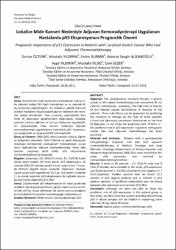Lokalize mide kanseri nedeniyle adjuvan kemoradyoterapi uygulanan hastalarda p53 ekspresyonun prognostik önemi

View/
Access
info:eu-repo/semantics/openAccessDate
2013Author
Öztürk, DuriyeYıldırım, Mustafa
Duman, Evrim
Alikanoğlu, Arsenal Sezgin
Yıldırım, Ayşe
Yıldız, Mustafa
Sezer, Cem
Metadata
Show full item recordAbstract
Amaç: Günümüzde mide kanserinde postoperatif yaklaşım- da standart tedavi 5FU bazlı kemoterapi ve eş zamanlı 45 Gy eksternal radyoterapidir. Bu tedavinin yüksek toksisite oranları hastaların büyük çoğunluğunun tedavisin-de kesin- tiye sebep olmaktadır. Tanı sırasında saptanabilen bazı klinik ve laboratuar parametreleri kullanılarak; tedaviye yanıtının tahmin edilmesi ile bu yan etkilerden kaçınılabili- nir. Çalışmamızda mide kanseri nedeniyle adjuvan kemoradyoterapi uyguladığımız hastalarda p53 ekspresyo- nun prognostik ve varsa prediktif rolü araştırıldı. Gereç ve Yöntem: 2008-2011 yılları arasında Antalya Eğitim ve Araştırma Hastanesi Tıbbi Onkoloji ve yerel Radyasyon Onkolojisi kliniklerinde postoperatif histopatolojik olarak tanısı doğrulanmış adjuvan kemoradyoterapi almış olan hastalar çalışmaya dahil edildi. p53 ekspresyonu immünohistokimya ile araştırıldı. Bulgular: Çalışmaya 11’i (%52,4) erkek, 9’u (%42,9) kadın olmak üzere toplam 20 hasta alındı. p53 ekspresyonu 13 hastada (%61,9) hastada pozitif olarak saptanırken 7 hasta- da (%33,3) negatif olarak saptandı. Hastaların medyan yaşam süresi p53 negatiflerde 12.2 ay, p53 pozitif olanlarda 11 ay olarak saptandı. p53 ekspresyonu ile sağkalım arasın- da ilişki tespit edilemedi (P:0,781). Sonuç: Çalışmamızda p53 ekspresyonun bu hasta grubunda prediktif rolünü gösterememize rağmen hasta serum örnek- lerinde p53’ün tespit edilmesini de içeren yeni çalışmaların bu konudaki bilinmeyenleri aydınlatacağını düşünüyoruz. Objective: The postopreative standard therapy in gastric cancer is 5FU based chemotherapy and concurrent 45 Gy external radiothearpy , nowadays. The high rates of toxicity of this thearpy causes discontiniuty in majority of the patients. These side effects can be prevented by predicting the response to therapy by the help of some spesisfic clinical and laboratory parameters determined at the time of diagnosis. In our study the prognostic and -if there is - the predictive role of p53 expression in patients with gastric cancer who had adjuvant chemotherapy has been searched. Material and Methods: Patients with a postoperative histopathologic diagnosis and who had adjuvant chemoradiotherapy in Medical Oncology and local Radiation Oncology Departments of Antalya Eucation and Research Hospital between 2008-2011 were enrolled in this study.p53 expression was searched by immunohistochemical method. Results: A total of 20 patients , (11 (%52,4) male and 9 (%42,9) female) were enrolled in the study. p53 expression was found positive in 13 (%61,9) patients and negative in 7 (%33,3)patients. Median survival time ws found 12.2 months in p53 negaive patients and 11 months in p53 positive patients. A significant relationship was not found between p53 expression and survival. (P:0,781). Conclucion: Although we were not able to show the predictive role of p53 expression in this patient group in this study, we think that new studies including determining p53 in blood samples will be helpful in explaining some unknown things about this issue.















